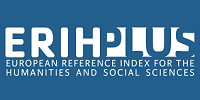When mobile applications come into the fiction : the gay literature ‘grindrized’
DOI:
https://doi.org/10.7203/HYBRIDA.2.20658Keywords:
Cultural Studies, Gay Studies, contemporary literature, intermediality, technology Abstract
Abstract
We propose to study the link between literature and new technology through the question of the integration of mobile applications within the gay literary creation of the 2010s. Image and fantasy occupy a main place in this new technologies. Their inclusion in the literary field leads to redefining relationships between image, oneself’s definition and literary fiction. Applications therefore seem to be a factor of textual transformation insofar as they modify a certain number of literary codes, making gay literature a « gindrized » space.
 Downloads
Downloads
 References
References
Alessandrin, A. & Raibaud, Y. (2014). Espaces homosexuels dans la ville. Hermès, La Revue, 2(2), 152-154. https://doi.org/10.3917/herm.069.0152
Bessière, J. (2010). Le roman contemporain ou la problématicité du monde. PUF.
Barthes, R. (1977). Fragments d’un discours amoureux. Seuil.
Bermann, M. (2019). Un coup d’un soir suivi de Dans le lit de Marin. POL.
Bourcier, S. (2018). Queer zones. Amsterdam.
Buffard-Moret, B. (2005). Introduction à la stylistique. Armand Colin.
Butler, J. (2006). Trouble dans le genre. Le féminisme et la subversion de l’identité. La Découverte.
Cahn, A. (2018). Les vacances du petit Renard. Seuil.
Cannone, B. (2001). Narrations de la vie intérieure. PUF.
Cohn, D. (1981). La transparence intérieure. Seuil.
Faccioli, P. (2007). La sociologie dans la société de l’image. Sociétés, 1(1), 9-18. https://doi.org/10.3917/soc.095.0009
Fuguet, A. (2016). Sudor. Random House.
Guillén, C. (2005). Entre lo uno y lo diverso. Tusquets.
Licoppe, C. (2016). Mobilités et rencontres dans les espaces publics urbains à l’âge des médias positionnels: Coutures, plis et rencontres avec des « inconnus pseudonymes ». Réseaux, 6(6), 117-143. https://doi.org/10.3917/res.200.0117
Mauvoisin, M. (2017). Dire son homosexualité : une autre médiation permise par Grindr. Sciences de la société, 100(2017), 131-145. https://doi.org/10.4000/sds.5931
Ong-Van-Cung, K. S. (2011). Critique et subjectivation. Foucault et Butler sur le sujet. Actuel Marx, 1(1), 148-161. https://doi.org/10.3917/amx.049.0148
Rabatel A. (2001). Les représentations de la parole intérieure. Langue française, 132, 72-95. https://doi.org/10.3406/lfr.2001.6316
Rey, A., & Rey-Debove, J. (2021). Le Petit Robert de la langue française. Le Robert.
Saint-Gelais, R. (2011), Fictions transfuges. La transfictionnalité et ses enjeux. Seuil.
Venzon, R. (2018). Reseña: Antonio L. Gil González y Pedro Javier Pardo (eds.), Adaptación 2.0. Estudios comparados sobre intermedialidad, Binges, Orbis Tertius, 2018, 302 pp. Siglo XXI. Literatura y cultura españolas, 16(2018), xi-xviii. https://doi.org/10.24197/sxxi.0.2018.xi-xviii
Published
How to Cite
-
Abstract525
-
HTML (Français )58
-
PDF (Français )365
Issue
Section
License
![]()
All the documents in the OJS platform are open access and property of their respective authors.
Authors publishing in the journal agree to the following terms:
- Authors keep the rights and guarantee HYBRIDA the right to be the first publication of the document, licensed under a Creative Commons license Attribution-NonCommercial-ShareAlike 4.0 International (CC BY-NC-SA 4.0) that allows others to share the work with an acknowledgement of authorship and publication in the journal.
- Authors are allowed and encouraged to spread their work (once published) through electronic means using personal or institutional websites (institutional open archives, personal websites or professional and academic networks profiles) once the text has been published.
















